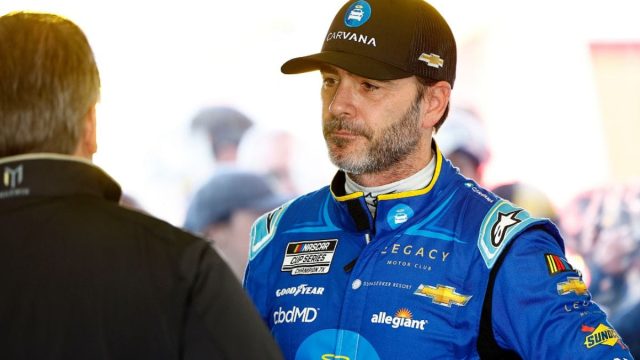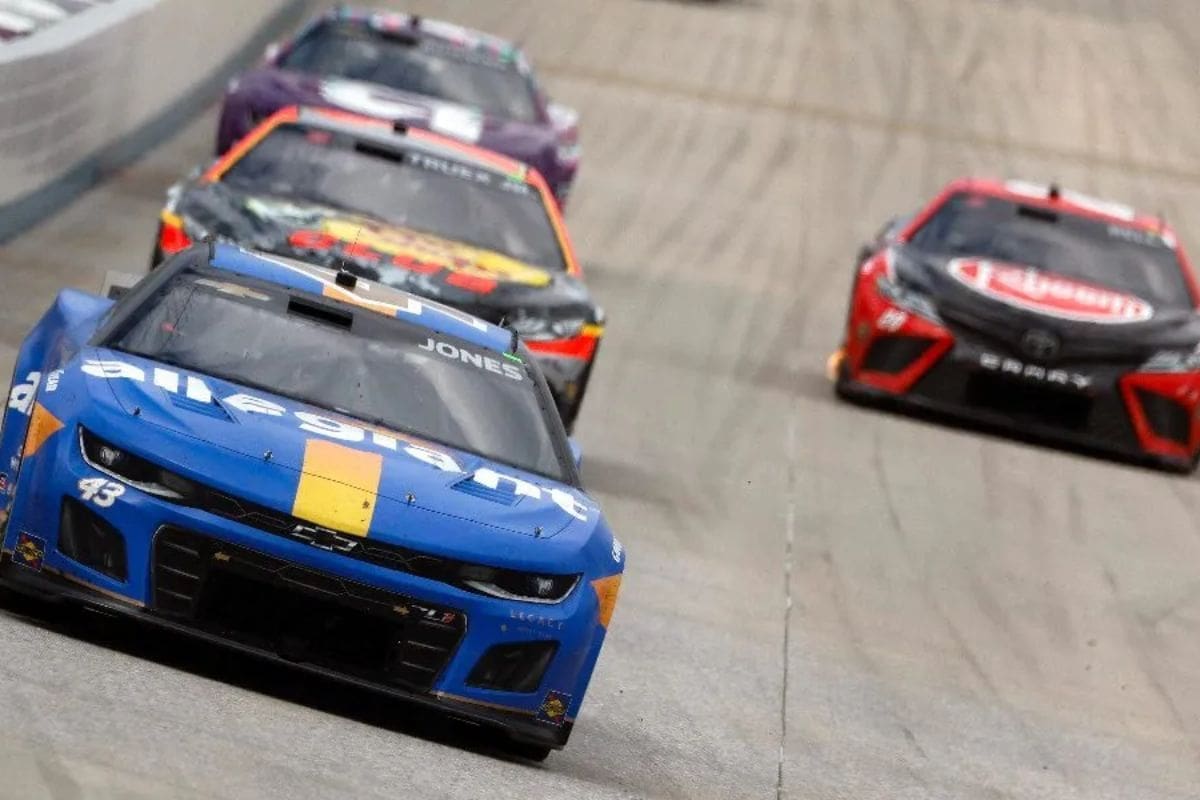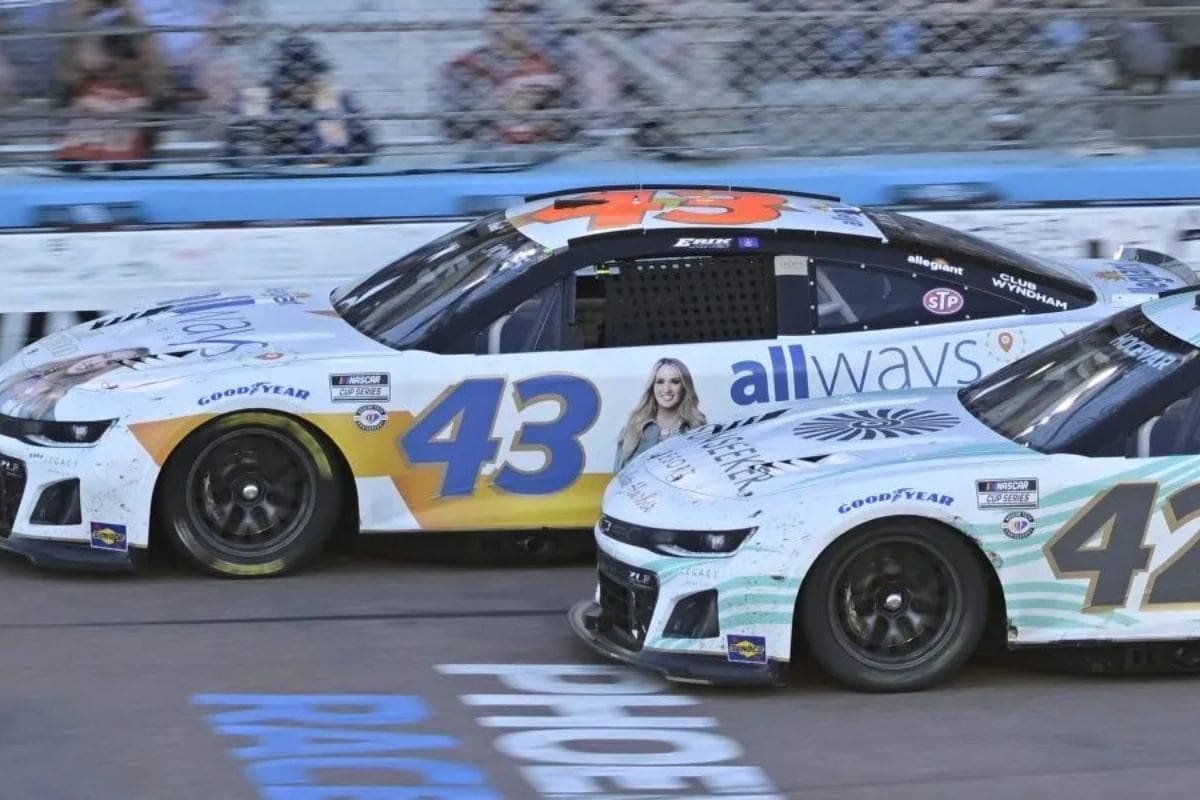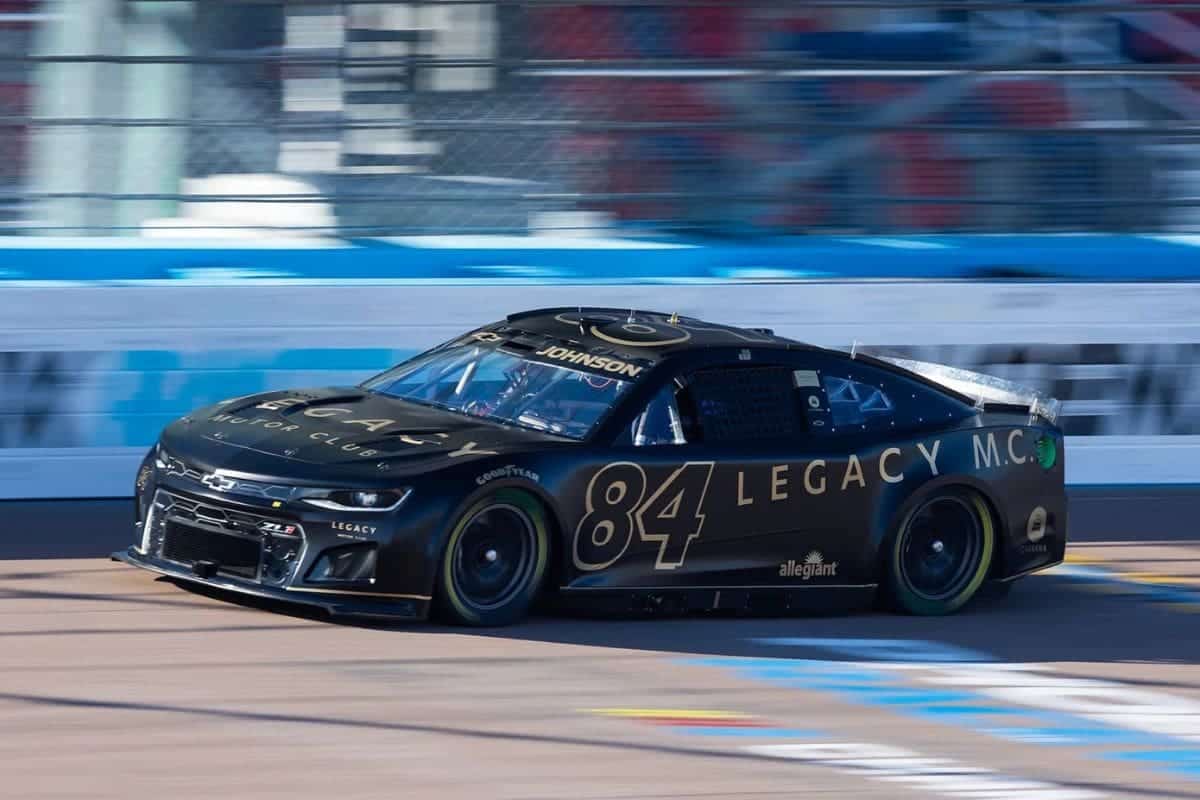Jimmie Johnson’s Shift From Chevrolet to Toyota: Jimmie Johnson‘s recent shift from Chevrolet to Toyota has brought to light considerable challenges for Legacy Motor Club (LMC), raising questions about the team’s tactical direction and competitiveness. Despite the allure of Toyota’s extensive resources, the initial performance of LMC drivers has been remarkably lackluster, suggesting deeper systemic issues within the team. The change not only disrupts existing dynamics but also casts doubt on LMC’s ability to maintain an independent identity in a fiercely competitive landscape.
Key Highlights
- The transition from Chevrolet to Toyota has not improved Legacy Motor Club’s performance, highlighting integration challenges and misalignment.
- Jimmie Johnson’s involvement has intensified scrutiny on the team’s performance amidst a competitive landscape.
- Current drivers, John Hunter Nemechek and Erik Jones, struggle to achieve competitive results, raising concerns over the Toyota partnership’s effectiveness.
- Historical data indicates steep learning curves with manufacturer shifts, complicating LMC’s transition to Toyota.
Changes at Legacy Motor Club
In a considerable tactical shift, Legacy Motor Club has undergone groundbreaking changes in leadership and partnership, highlighted by Jimmie Johnson‘s increased involvement and the decision to move from Chevrolet to Toyota as their primary OEM partner. This change marks a significant departure from the team’s historical alignment with Chevrolet, under which Johnson secured seven championships. The elevation of Johnson’s role suggests a deliberate plan to utilize his vast experience and insight to steer the organization through a period of transformation.
In parallel, the appointment of Trevor Bayne as the new competition advisor and Bobby Kennedy as general manager indicates a shift in the team’s operational dynamics. Bayne’s expertise in competition will be essential as the team navigates the complexities of a new OEM relationship. Meanwhile, Kennedy’s responsibilities involve a broader administrative and tactical oversight that is imperative for coherent execution of the team’s vision.
The decision to align with Toyota signals a pursuit of a long-term tactical alliance, aimed at enhancing performance and competitiveness. However, this move is not without risks; the preliminary outcomes of the partnership have raised concerns regarding its efficacy. The opening half of the 2024 season indicates potential misalignment, as the team grapples with the integration of new technologies, resources, and methodologies inherent to Toyota’s framework.
Performance of Legacy Motor Club with Toyota
The initial results for Legacy Motor Club‘s partnership with Toyota have not met expectations, highlighting challenges in adapting to a new specialized alliance amid a competitive landscape. While the decision to shift from Chevrolet was tactical—aimed at reducing competition within the manufacturer’s roster—LMC has struggled to translate this potential advantage into tangible performance on the track.
Toyota entered the season with a robust lineup of eight cars, suggesting a solid foundation for LMC to build upon. However, the anticipated synergy has yet to materialize. The change necessitates not only a change in equipment but also a recalibration of team dynamics and operational approaches. Unlike Chevrolet, which boasts a larger contingent of teams, Toyota’s less-crowded roster initially appeared promising for LMC’s aspirations to carve out a distinct niche. Yet the reality has proven to be more complex.
The historical data indicates that teams often face a steep learning curve when shifting manufacturers, as each brand comes with unique engineering philosophies and performance characteristics. This learning curve appears to be particularly pronounced for LMC, which has not yet found its footing in a competitive field.
The lack of immediate results raises concerns about whether the alignment with Toyota will yield the long-term benefits LMC envisioned. As the season progresses, a critical examination of the team’s adaptability and performance metrics will be crucial in evaluating the viability of this partnership moving forward.
Performance of LMC Drivers
Struggling to find their competitive edge, LMC drivers have faced substantial challenges this season, with John Hunter Nemechek and Erik Jones failing to secure consistent top finishes amidst a demanding racing environment.
Nemechek, piloting the No. 42 Toyota Camry, has endured a particularly arduous campaign, managing only three top-10 finishes out of 22 starts. His performance is further blemished by five races ending in a DNF, relegating him to a disappointing 31st in the points standings, well outside the playoff picture.
Erik Jones, driving the No. 43 Toyota Camry, mirrors Nemechek’s struggles, though he has shown slightly more reliability with ten top-20 finishes. Despite this, sitting 27th in the standings highlights the lack of competitiveness within the team. The persistent absence of top-tier results raises questions about the effectiveness of LMC’s shift to Toyota and its comprehensive strategy in a highly competitive series.
Even the legendary Jimmie Johnson, who is running a partial schedule in the No. 48 Toyota, has been unable to translate his vast experience into success, further emphasizing the systemic issues plaguing the organization.
Legacy Motor Club’s Philosophy on Technical Alliances
Legacy Motor Club’s tactical philosophy emphasizes the importance of cultivating an independent program rather than relying on specialized alliances, aiming to establish a sustainable foundation for future success in NASCAR. This calculated approach reflects a desire for self-sufficiency and long-term resilience in a highly competitive environment. By giving up typical technical partnerships, which often provide immediate access to the resources of established teams, LMC is prioritizing the development of its capabilities and expertise.
While teams like 23XI Racing and Trackhouse Racing utilize partnerships for a quicker ascent, LMC is consciously avoiding this route. Such alliances may offer short-term advantages, yet they can also impose limitations on innovation and autonomy. For LMC, building an independent program may initially appear to yield slower progress, but it aligns with a vision of creating a robust operational framework that could yield considerable dividends over time.
Investing in their technical resources and talent allows LMC to cultivate a unique identity within the NASCAR landscape. This approach fosters an environment where the team can experiment, learn, and adapt without the constraints that often accompany external dependencies. Furthermore, this philosophy underlines a commitment to developing a competitive edge that is authentically theirs, rather than one borrowed from established powerhouses.
Ultimately, while the shift to Toyota has posed challenges, LMC’s focus on independence positions them favorably for sustained growth and success in the evolving dynamics of NASCAR. Their commitment to self-reliance may be the cornerstone upon which their future achievements are built.
Future Outlook for Legacy Motor Club and Toyota Partnership
LMC’s partnership with Toyota presents an essential opportunity to reshape its competitive landscape, allowing the team to utilize advanced resources while cultivating an independent identity. This tactical shift aims to mitigate the challenges faced during their tenure with Chevrolet, where LMC often found itself overshadowed by larger teams. By aligning with Toyota, LMC can capitalize on a robust infrastructure and specialized expertise that may improve on-track performance.
However, the early indicators of this partnership raise questions about its efficacy. Despite the potential advantages, LMC’s current mediocrity in performance suggests that merely having access to superior resources does not guarantee success. The team’s ability to adapt from a reliance on external influences to a self-sufficient model will be essential in determining the longevity and effectiveness of this alliance.
Moreover, the dynamics of the NASCAR ecosystem suggest that specialized partnerships are most beneficial when they foster collaboration without stifling innovation. LMC’s ambition to develop its race shop and components reflects a desire for autonomy, yet the effectiveness of this strategy remains to be seen. The balance between collaboration with Toyota and the pursuit of independent innovation will be vital in handling the complexities of the racing circuit.
News in Brief: Jimmie Johnson’s Shift From Chevrolet to Toyota
The shift of Legacy Motor Club from Chevrolet to Toyota has highlighted considerable challenges, including integration difficulties and disappointing performance results. While the potential benefits of Toyota’s resources are substantial, initial outcomes suggest a misalignment between LMC’s operational strategies and the demands of a new specialized partnership.
A re-evaluation of team dynamics and a focused approach to cultivating an independent program may be crucial for long-term success. The future of this partnership remains uncertain amidst competitive demands.
ALSO READ: Jimmie Johnson Faces Ownership Challenges During Crew Chief Changes



